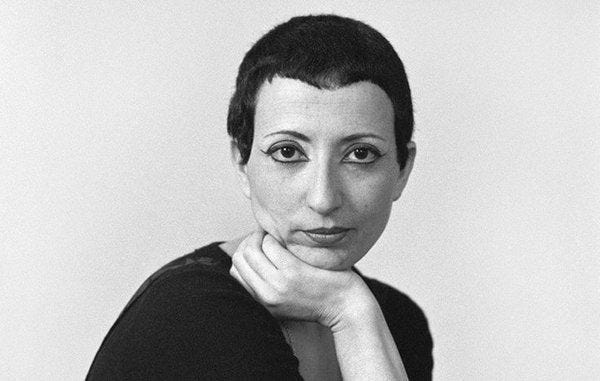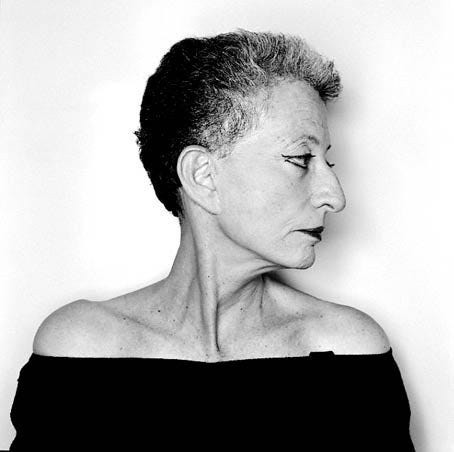Tonight we gathered for my inaugural Feminist Essay Club where we kicked things off by discussing Hélène Cixous’ The Laugh of the Medusa.
Below is a recording for paid subscribers who weren’t able to make the live meet-up, but you can still upgrade and watch and then join in the discussion in the comments.
I also hope anyone attending will feel welcome to continue what was a fascinating discussion in the comments because we could have continued chatting for far longer.
The aim of White Ink’s Feminist Essay Club is to introduce (or reintroduce) us to feminist writers and their work. The next Feminist Essay Club will be held on Sunday, July 27th at 7pm (London time), and I will post the next essay we will be discussing later in the week.
Free subscribers may wish to enjoy this little introduction to Hélène Cixous, her life and her work which I shared with the group (I certainly hope after reading it you would consider upgrading), and paid subscribers will find the recording of our session at the bottom of the page.
Hélène Cixous is a fascinating and extraordinary character, a writer, a playwright and a literary critic.
She was born in 1937 – between two world wars – in Oran, colonial Algeria. Her father was a Sephardic Jew whose ancestors came from Spain, her mother was an Austro-German Ashkenazi Jew from Germany. She says she began her ‘philosophical life’ at the age of three when she experienced antisemitism for the first time when some kids in a playground told her ‘all Jews are liars’. She thought: ‘What does that mean? I wasn’t even certain that I was a Jew - and a liar I was sure I wasn’t.’
Her father died in 1948 and she was left alone with her widowed mother. Her mother trained as a midwife to provide for them and often called on her daughter to help her attending to women in labour, asking her to give them injections when she didn’t have enough hands for her patients. Cixous says as a child she ‘saw all sorts of things’ as a result, including women experiencing abortion, though it was illegal. ‘I sided with women naturally,’ she says, ‘my whole family at that point was women. My German grandmother was a widow. It was natural to be with women. I spent my youth in a world of women who were, who insisted to be, witnesses to the fate of women.’
She left Algeria for France in 1955, and she says that while she didn’t experience antisemitism in France (as ‘all the Jews had been deported’), it was the first time she encountered misogyny: ‘…there was something else in the air in France at the time, which was stuffy. There were only men at the university I attended. Something again was there like a barrier, and you couldn’t overcome the repulsion that you felt. I analysed it and I realised it was misogyny. So I thought “well, the enemy is not what I originally thought. It was not antisemitism, but misogyny.”’
She decided she could not fight for the rights of both causes, and so she chose, in her words, the ‘main cause — the women’s cause.’ ‘But then of course these fights join,’ she said later, ‘and you can’t really separate them. You have to fight all the fights.’
She was in Paris in 1968 for the riots, raising her young children alone, working towards her PhD and taking them along to the protests.
‘I’ve always thought that the best student I ever had was my own daughter’ — Hélène Cixous
‘I didn’t see having children as anti-feminist. Women are strong. They can raise children and study, all at the same time.’ She says she was happy to have had her children so early. ‘It was an excellent choice because when they were twenty, they were my friends. And I’ve always thought that the best student I ever had was my own daughter.’
I love that.
When her mother was chased out of Algeria in the 1970s, she says she wondered again: ‘Should I be principally on women’s side or with the Jews against antisemitism?’ She says now that when she looks back at her work, it’s always been the two together, ‘the work of the double all the time.’
She first gained attention for her 1970 debut novel, Dedans (Inside) a work of semi-autobiography which won the Prix Médicis, but she has gone on to write 40 books, more than a dozen plays and countless essays including her most well-known, The Laugh of the Medusa.
In 1974, she organised the first university program for gender studies in Europe, though with each progress she has witnessed, she has also despaired at how things can be torn down cyclically. ‘This is the story of the planet, of mankind. If something works out, that progress destroys what it has constructed. And once again, we are now in a period of destruction…. it goes on and on, and it won’t stop. It means that one has to be in action all the time - there’s no retirement for progress, no.’
On coming to the page, she has this to say: ‘Writing was born for me when my father died. I lost him very early. But he gave me death, and death and I came into a dialogue then: Who will be stronger? Is death going to kill me, or is it going to give me visions, inspiration, courage inside the awful experience of a terrible weakness? I think art is always answering to the threat of death. but you don’t throw yourself into it. You just answer.’
And this: ‘Writing is a kind of strange relation toward your otherness, toward your questions. Who am I? I don’t know, of course. I’m asking myself, and looking into mirrors that have the power to perceive the deep images that I myself don’t see. It’s a way of discovering your secret twin, your foreign twin, your strange twin. When you write, you’re completely immersed in the pursuit of this other who live — I use the plural on purpose — somewhere in your depths and trans you into a psychic state where you must recognised, and not regret, that no-one can ask you to leave your fascination. You thirst for that other, your deep self, which you can only evoke. It has the same unpresence or presence as God; we can’t do without it.’
On writing The Laugh of The Medusa: ‘When I came to France, I suddenly discovered that I was also a woman. France was supposedly an educated country, but when I arrived I saw that it was not true! This was the fate of women generally speaking: suffering, ignorance, and social and political situations that sentenced them to being the maids of men. I started looking at my contemporaries. I said, ‘My God! They’re not even their own friends. They don’t even know what it is to be a woman.’ What is jouissance, what is enjoyment, what is sexual pleasure? I saw that they didn’t know anything about that. That’s why I wrote The Laugh of the Medusa. It was as if suddenly I woke up. It was a king of intellectual evolution. I thought: ‘The fire is now burning with the world of women. So I have to give all my strength there — knowing that we won’t get to victory while I’m alive, that this is a struggle that will last for centuries. But being a woman who belongs to women, I couldn’t hesitate.’
The Laugh of the Medusa is a pivotal feminist essay published in 1975, it critiques patriarchal structures that limit women’s voices and encourages women to reclaim their identities, ideas, lives and experiences through storytelling, through writing with their ‘white ink’, their breastmilk or that of their maternal line. You can see why Cixous’ white ink inspired the name of this very Substack.
The Laugh of the Medusa remains a crucial text in feminist literary criticisms, pushing for revolution in how women’s experiences are articulated and understood in the world and in literature.
Here is a link to the text if you would like to read it. This essay always makes me want to punch the air. It is brilliant, I hope you will agree.
And here follows our discussion about this essay which marked Cixous out as one of our most important feminist thinkers of the 20th century and beyond. She is now 88, still working and said to be a contender for the Nobel Prize for Literature. We shall see, but at least if she wins we will have known her a little better for this feminist essay club.
Thanks to all those who attended, see you next month, and here’s the recording if you would like to catch up:






